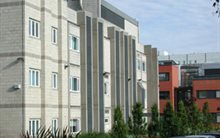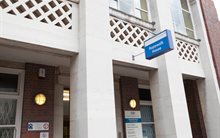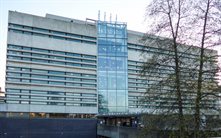
Who are Hearing Sciences?
We are part of the Academic Unit of Mental Health and Clinical Neuroscience in the School of Medicine.
Leadership
Our research leads and fellowship holders include:
As well as delivering their research, our colleagues supervise many PhD students and contribute to teaching on undergraduate courses in Medicine and Neuroscience. Please contact us for any opportunities.
Structure
All of our research groups are interested in questions that are timely, important and offer new insight or impact. Our research falls into four natural themes:
Decoding the Auditory System (the brain circuity of hearing, how auditory perceptions arise, and how people listen in everyday situations)
Understanding Disability (listening by individuals with hearing-related problems with or without hearing devices, deep phenotyping, and determination of patients’ priorities)
Measuring Ability (core-outcome scales, development of hearing-test materials and methods, objective measures, and ecological momentary assessment)
Advancing Treatment (telecare, hearing-device fitting methods and potential treatments for tinnitus)
Together many of us are funded by the Hearing theme of the NIHR Nottingham Biomedical Research Centre. Our aims are to develop and evaluate innovative therapeutic approaches, determine optimal treatments for specific phenotypes, maximise the effectiveness of current technologies and treatments, and understand and address consequences for multi-morbidity and long-term health. We also have other funding from UKRI and NIHR fellowships, programmes and project grants, EU Marie Curie-Skłodowska studentships, charity support and industry links.
Hearing Sciences was created in 2018 from the merger of two hearing research groups in Nottingham: the former MRC Institute of Hearing Research (founded in 1977 and merged into the university in 2016), and the former NIHR National Biomedical Research Unit in Hearing (founded in 2008). We have offices and laboratories on three sites: Hearing Sciences on University Park, NHS Ropewalk House in Nottingham city centre, and the New Lister Building of the Glasgow Royal Infirmary. Our laboratories are equipped with modern sound-proof rooms of various sizes as large as about 5m2, loudspeaker arrays, motion-tracking equipment, EEG & fNIRS facilities, neuroscience tools, and acoustic, sound, audiometric and hearing-device measuring equipment. We also have a website for online experiments.
University Park

Located on Science Road, the Hearing Sciences buidling was originally constructed for the MRC Institute of Hearing Research
Ropewalk House

The NIHR Nottingham Hearing BRU is primarily situated within Ropewalk House in Nottingham city centre, and once housed part of the former General Hospital.
New Lister Building

The Scottish Section is located within the Glasgow Royal Infirmary's New Lister Building.
Major funders